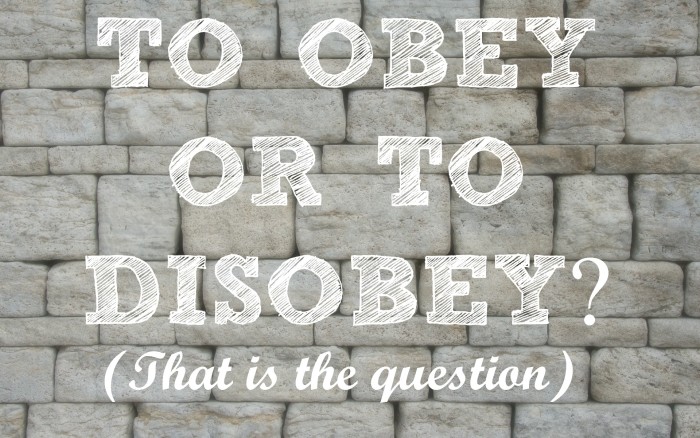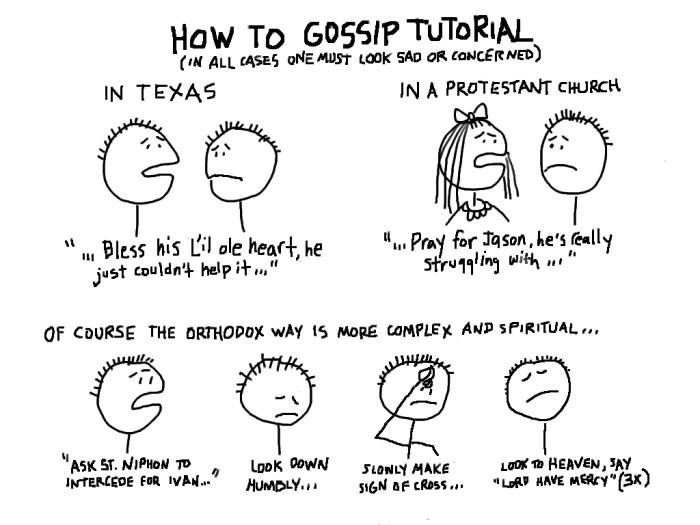
Every person needs to answer this question early on in his or her life–
Will I obey (submit to) God’s commands or will I disobey (rebel)?
Therein lies the whole dilemma of man. Oh, many of us don’t even really think about it in these terms, but when we remove all of the “stuff” and the “dialogue” this is the crux of the matter. This is why some are so zealous to deny God’s existence. And why some are so passionate about discrediting His Word.
And, yet, deep within each of us is knowledge of the ultimate Truth (Romans 1:19-20). And we have a choice to make.
If this is the first time you are reading through the Old Testament, it can be a little overwhelming. There is so much about offerings and sacrifices and laws. It seems like not one area of daily life remains uncovered in the books of Leviticus, Numbers, and Deuteronomy. Along with the laws, we have been reading of Israelite censuses and their battles, idolatry, and travels from place to place. But right in the middle of it all is an amazing chapter. Leviticus 26. In our Bibles the words of this chapter appear to be more poetic and Psalm-like than the chapters before and after it, and yet, it reads like an explanation of perhaps the most basic law of all–
–If the Israelites will walk in God’s statutes and obey His commandments, He will bless them (verse 3).
BUT
–If they do not obey Him and do not observe the commandments, despising His statutes and abhorring His judgments, God will set His face against them and they shall be defeated (verses 14-17).
If you read the whole chapter, you will read even further details about what happens to the nation when it obeys and when it disobeys. As we continue our journey in the Old Testament, we will find out that, while God continues to have incredible love and mercy for this special group of people, the children of Israel experience much pain and turmoil because of their disobedience and idolatry.
So that leads to a rather natural question–
Is this a principal only for the Israelites or does it apply today? Does obedience have any correlation to blessing from God? And disobedience to struggles and hard times?
What do you think?
Personally, I tend to think so. No, we don’t have God speaking to us as we journey through the wilderness, but if we think about some of the lives around us, we can still see this law in place.
Think of someone who is not saved but lives a very moral life. They may be very religious or they may just have grown up with very moral, good parents. Whatever the reason, they actually follow many of God’s laws, even though they are not doing so for the same reason we would (to please our Savior). And yet, many of these good, moral people avoid so much heartache because they are following the commands God sets forth in His Word.
These people honor their parents, don’t lie or cheat or steal; they stay clear of debt and are committed to their marriages.
In doing so, they often reap the benefits of following God’s laws. God has set up our lives to work much better when we obey His commandments and we reap the benefits in the here and now — whether we are saved or unsaved. Of course, if we are saved, we reap even greater rewards for our obedience in the future.
Now think of someone who has made poor choices. They make a habit of lying. Or stealing. They drink too much or they run around on their spouse. Do you envy that person’s life? I doubt it. We can see clearly that most of the time, people reap terrible fruit when they make terrible choices.
This chapter 26 is really interesting to me. God shows very plainly that obedience brings blessing and disobedience brings His wrath. It seems so clear.
So why do we act so surprised when we shake our fist at God and tell Him that we are going to do things our own way and then reap the terrible consequences of our selfish, ungodly choices?
Until we make the choice to follow God whole-heartedly, committed to obeying His commands, we are going to struggle continuously and be defeated over and over again. And, as believers, we don’t have any valid reason or excuse to continue to live in sin, bearing the pain and unpleasantness that is eventually reaped from this choice, because God has provided everything we need to lead a godly life (2 Peter 1:2-4).
Let’s bring this a little closer to home. Most of you are not having affairs or getting drunk. Many of our sinful choices we Christians make are considered “non-sins”, especially when we compare our lives to the lives of the ungodly. But let’s talk about an example that is very familiar to many of us— our bodies.
We have the responsibility to take care of our bodies and yet, over and over again, many of us feed our body the wrong things or way more than we need. Some of us abuse our bodies by working too long and hard or not sleeping enough. Many of us are too busy or lazy for proper exercise. And a few of us may even struggle with abusive substances that are really bad for our bodies like cigarettes, alcohol, or prescription drugs.
However, I think we can all agree that until we treat our bodies in a way that honors God (Romans 12:1-2; I Corinthians 6:19-20), we will be in a continuous struggle. But if we submit our bodies– what we eat, how much we sleep, how many hours we work, etc.– completely to God, digging in His Word and praying for guidance, then this particular battle will wane and we will be able to rest easy knowing we have done our part in obeying God in this area of our lives. Along with that will often come a healthier body and mind, as this is the usual outcome of treating our bodies well.
Certainly, the blessings of obedience are not always tangible. We aren’t promised health and wealth. While in this Leviticus passage, we actually see that God’s promises the Israelites good harvests (vs. 4-5), safety and peace (vs. 5-7), victory in battles with their enemies (vs. 7-8), lots of descendants (vs. 9), to be their God and to walk with them (vs. 12), we must recognize that this was a very special group of people at a very special time.
We do not find the same specific promises given to us in the New Testament. Instead we find the context of keeping God’s commands wrapped up in the offering of our love. We obey because we love God. Over and over again, this is what we read in the New Testament. Check out John 14:15, 21; John 15:10; I John 5:3; and 2 John 1:6.
There are promised rewards, of course. We read of the imperishable crown or wreath (I Corinthians 9:25), the crown of righteousness (2 Timothy 4:8), that we will be bearers of much fruit (John 15:5), have mansions in heaven (John 14:2) and enjoy a deep, abiding fellowship with our Savior (I John 3:22-25).
And so we are left with our most basic decision–
Will we show our love by obeying God’s commands or will we choose to disobey?
Whatever we decide, we can be sure there will be consequences.










